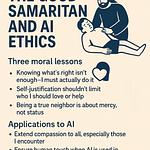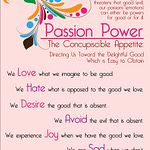Hello friends,
Are you curious about what the future might look like? Rather than relying on mystical methods, technology is now offering data-driven insights into what lies ahead. Today, we’re exploring the fascinating (and sometimes unsettling) realm of artificial intelligence as it forecasts health outcomes, career paths, and even relationship possibilities.
We’ll dig into AI “fortune telling,” the promise and pitfalls of predictive health technology, and why probability isn’t the same as destiny. Finally, we’ll zoom out for a Christian perspective on foreknowledge, free will, and how to use predictive technologies ethically and lovingly.
Let’s get started.
1. AI: A New Kind of Crystal Ball?
We’re past mere speculation. AI can now analyze your data—medical records, smartwatch data, and even social media footprints—to forecast likely paths. The capability is constantly evolving as the data streams in.
Probabilities, not guarantees: AI can crunch massive datasets and give you percentages—like a 60% chance of a health issue or a 30% likelihood you’ll switch jobs.
Living forecasts: These predictions adapt as new information arrives. Start exercising more, change jobs, or relocate, and the AI recalibrates its forecast.
Still, humans are far more complex than neat lines of code. AI doesn’t fully understand your story; it simply looks for patterns.
2. AI Fortune Telling? Meet DeepSeek R1
A striking example comes from China, where an AI called DeepSeek R1 is used for Bazi readings (also known as the “four pillars of destiny” in traditional Chinese fortune telling). It interprets your birth date and the five traditional elements (wood, fire, earth, metal, water) to suggest possible career paths, compatibility, and turning points. Bazi is essentially a form of traditional Chinese astrology.
Why it’s popular: Younger generations love instant, data-driven predictions—like a tech-savvy twist on an ancient tradition.
A caution: AI may “know the rules,” but it can’t capture nuances of personal relationships or the human soul, so it’s Bazi readings may not be as correct or personalized as a human practitioners.
Doesn’t mean it’s true: Just because AI can calculate Bazi readings doesn’t mean the Bazi system is actually accurate at predicting one’s future.
3. Healthcare: Your Personal Future Dashboard
Where predictive AI may truly shine is healthcare. Algorithms like Open Evidence may eventually assist doctors by synthesizing electronic health records, test results, and genetic information to forecast:
Disease progression – spotting subtle warnings before issues become acute
Treatment efficacy – predicting how you’ll respond to therapies
Long-term health outlook – from heart attack risk to potential genetic predispositions
The promise is huge. Imagine an app that integrates with your smartwatch and pings you about early warning signs. But keep in mind: data bias, unknown variables, and sheer randomness limit any model’s ability to cover all possibilities.
4. Your Entire Life, Predicted?
One futuristic vision: an AI that merges all major areas of your life—career, finances, health, even relationships—into a single forecast.
The dream: A “personal futures dashboard” that alerts you to major stress ahead, suggests when to budget carefully, or identifies when family members might need extra care - forecasting from today to the years ahead.
Reality check: AI can be great at analyzing patterns. But spiritual health? Emotional nuances? Sudden life changes? Those can be difficult to quantify.
Remember: AI’s predictions can help you plan. They aren’t destiny.
5. Where AI Shines—and Stumbles
Specific domains (like credit card fraud or weather predictions) can yield extremely accurate AI forecasts.
Human lives are a “messy data set” full of random events, emotional shifts, and complex motivations. AI struggles to account for genuine novelty (technically called “out-of-distribution generalization”): a new invention, an unexpected tragedy, or a spur-of-the-moment decision.
Bias is real. If your data comes from groups not represented in the training set, you may get wildly off-base predictions.
Key takeaway: short-term predictions or stable domains fare better than long-term, wide-ranging forecasts.
6. Superforecasting and the Human + AI Dream Team
Researchers like Philip Tetlock have studied “superforecasters”—humans exceptionally good at making accurate predictions. They share certain habits:
Work in probabilities: No black-and-white prophecies.
Constantly update with new data.
Avoid bias: Seek diverse sources and question assumptions.
Track accuracy to learn from mistakes.
AI can integrate these principles by using ensemble models (teams of models) and continuous feedback loops. One study shows that when human forecasters (not necessarily superforecasters) receive AI insights, humans’ forecasting accuracy can improve substantially. The best approach may be a partnership, as opposed to a competition.
7. Faith and Free Will: A Christian Perspective
After hearing about AI’s predictive prowess, you might wonder: Does foreknowledge mean things are predetermined? In Christian theology, God’s complete knowledge of the future doesn’t negate our free will—knowing something doesn’t cause it to happen.
Biblical echoes: James 4:14 reminds us we can’t presume tomorrow, while Luke 12:54–59 acknowledges we can observe patterns (like weather) to make wise decisions.
Divination forbidden: Scripture forbids fortune-telling (Deuteronomy 18:10–13) but does allow for natural phenomena to be used for indicating signs and time through the operation of natural laws (Genesis 1:14).
Avoid idolatry: If AI predictions become an idol, dictating every choice and overshadowing divine wisdom, we’ve replaced God with an algorithm. This should be avoided.
Ultimately, just because an AI “knows” something about our future doesn’t mean we lose our free will or moral responsibility.
8. Using Predictions Ethically and Lovingly
What if an AI predicts a friend’s hardship next week or a family member’s upcoming period of stress? The Christian principle of “Love your neighbor” points us to respond with empathy and support rather than exploitation or manipulation. AI’s insights should be used to help us become better neighbors.
9. Final Thoughts
So, can ChatGPT—or any AI—predict your future? Yes and no. It can analyze trends, probabilities, and data patterns, and will probably get better at its analysis in the future. But it can’t capture the unpredictable essence of being human. Nor should it overshadow your own moral agency or faith perspective.
The real power here is partnership: harnessing AI’s data-driven insights in tandem with love, wisdom, and free will. AI can spotlight possibilities, but you still choose your path.
Where could better predictions improve your life? That’s the question to ponder. Consider how AI might help you make more informed decisions—while retaining your sense of freedom and responsibility.
Thanks for reading! If you found this exploration helpful, I invite you to subscribe to Shattering Illusions for more insights on tech, Christianity, economics, and beyond.
Stay tuned for the next post: “Are We Reawakening Ancient Curses in the Age of AI?”








Share this post